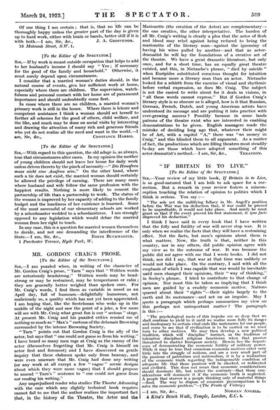" IF BRITAIN IS TO LIVE." [To the Editor of
the SPECTATOR.]
SIR,—Your review of my little book, If Britain is to Live, is so good-natured that I am loth to ask space for a cor- rection. But a remark in your review fosters a miscon- ception touching the relation of opinion to politics which I think is serious. You say :-
" The sole yet the nullifying fallacy in Mr. Angel's position before the War was his deduction that, if war could be proved to be unprofitable, it would not take place. And surely he must grant us that if the event proved his first statement, it ipso facto disproved his deduction."
I think I have said in every book that I have written that the folly and futility of war will never stop war. It is only when we realize the facts that they will have a restraining effect. Not the facts, but men's opinions about them is what matters. Now, the truth is that, neither in this country, nor in any others, did public opinion agree with my view as to the outcome of war. It was because the public did not agree with me that I wrote books. I did not think, nor did I say, that war at that time was unlikely or would not take place. On the contrary, I said with all the emphasis of which I was capable that war would be inevitable until men changed their opinions, their " way of thinking," in Seeley's phrase. I tried to contribute to that change of opinion. Nor must this be taken as implying that I think men are guided by a crudely economic motive. Nations quarrel about their " rights "—their rights largely to the earth and its sustenance—and act on an impulse. May I ,quote a paragraph which perhaps summarizes my view on this perhaps not unimportant matter ? The paragraph is this :—
" The psychological roots of this impulse are so deep that we shall continue to yield to it until we realize more fully its danger and inadequacy to certain vital ends like sustenance for our people. and come to see that if civilization is to be carried on we must turn to other motives. We may then develop a new political tradition, which will ' discipline instinct, as the tradition of toleration disciplined religious fanaticism when that passion threatened to shatter European society. Herein lies the import- ance of demonstrating the economic futility of military power. While it may be true that conscious economic motives enter very little into the struggle of nations, and are a very small part of the passions of patriotism and nationalism, it is by a realization of the economic truth regarding the indispensable condition of adequate life that those passions will be checked, or redirected and civilized. This does not mean that economic considerations should dominate life, but rather the contrary—that those con- siderations will dominate it if the economic truth is neglected. A people that starves is a people thinking only of material things —food. The way to dispose of economicpreoccupations is to solve the economic problem."—( The Fruits of Victory.) 4 King's Bench Walk, Temple, London, E.C. 4.


































































 Previous page
Previous page